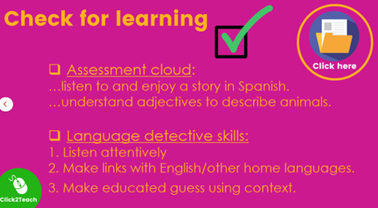Becoming Language Detectives
Empowering young learners with effective language learning skills
When it comes to teaching primary languages, we should ask ourselves what it means to be an effective language learner. Our young learners need to be taught strategies to help them to become effective language learners and at Primary Languages Network we call this being a ‘Language Detective.’ To be a language detective we can teach them explicit language learning strategies called ‘Language Detective skills.’
What are language detective skills?
These are a set of strategies that facilitate language learning for our children and help them to become more independent, confident and effective learners. Some of the most frequently used skills include:
Speak confidently
Join in with games and actions to aid memorisation
Find learning links and memory hooks to help remember new words
Make links with English/other languages (looking for cognates and semi cognates)
Listen attentively
Imitate pronunciation of sounds
Identify key sounds and silent letters
Have a positive attitude to learning about language and other cultures
Use a bilingual dictionary to check spellings or look up new words
Take risks and learn from mistake
Taking risks and learning from mistakes should be encouraged to students from the start, this builds confidence and children learn to just have a go without fear of getting things wrong. Once children understand that it is ok to make mistakes then the other skills will follow.
When should I start with language detective skills?
Start teaching these skills in the first lesson with a new class. The children need to understand what the language detective skills are, how they help us to learn and understand that these form a part of every single language lesson. To do this in a child-friendly way, introduce the class to Curio the language detective and his dog Fetch, then look at some of the most common skills with the children. It does take time at first to introduce the idea of language detective, but once children understand it, it becomes routine.
Children could be asked to nominate a language detective winner at the end of lessons. This gives the opportunity to compliment each other's learning and say what other children did well and which skills they used. I often ask the language detective from the previous week to nominate someone.
How do I fit language detective skills into my lesson?
Try to embed language detective skills and certificate nominations as part of your language lesson routine. Why not have this at the start of your lesson along with the learning objective? Explain to the class what language detective skills you will be expecting to see, like with the learning objectives, it allows the class to understand what skills they will need to use.
What do language detective skills look like in practice?
As an example, let’s look at the skill of making links with English/other languages. This is where children look for cognates and semi cognates with either English or a home language. An example from a recent lesson on the topic of the beach, a pupil explained that in their home language the word for ‘slipper’ sounded similar to the word "flip flop" in Spanish and this helped them to remember the Spanish word. It is important to remember that children with English as an additional language can thrive in language lessons as they can sometimes find links between words in the target language and their home language, such a confidence booster!
How can we celebrate our language detective winners?
On our VLE we have a language detective certificate. These can be used as often as you like but one per lesson is the best. The children love these certificates and try their best to use these skills to win the certificate.
Some schools celebrate the language detectives in weekly assemblies along with other awards. This is an opportunity to show the importance of language learning in school and demonstrate that it is equally as important as other subjects. St Michael’s Catholic Primary School in Widnes celebrate the language detective winners in their celebration assemblies each week and often celebrate these on Twitter too.
Lisa Ormes
Associate Primary Languages Teacher
Lisa Ormes is an associate language teacher at PLN specialising in Spanish and has worked with us for the last four years across a number of schools. Lisa has a wealth of teaching experience including secondary and sixth form as well as English as a Foreign Language in Spain and Japan. She is passionate about helping our young learners to become independent language detectives whilst developing a love for languages.





